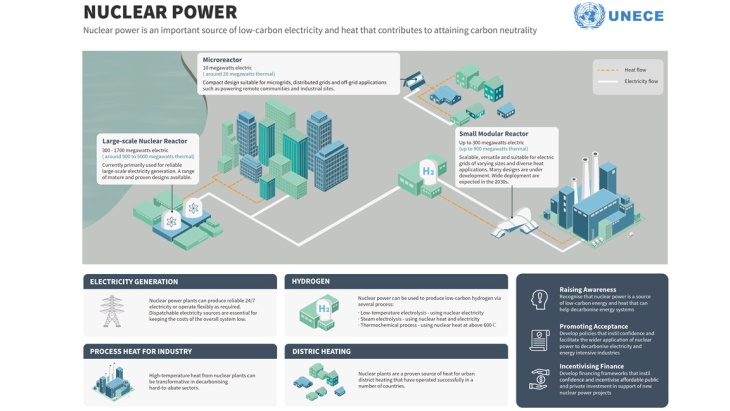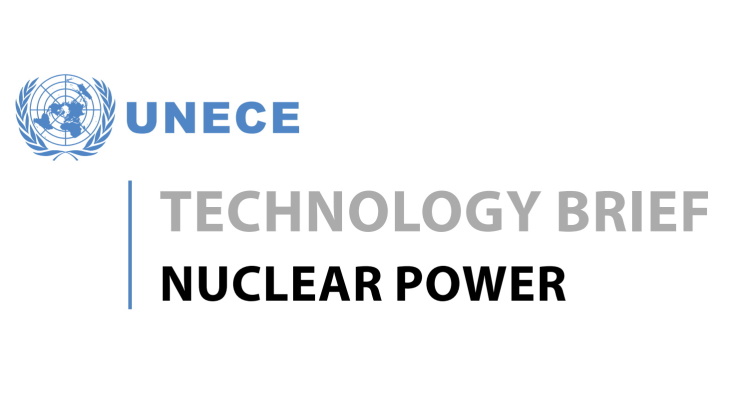The nuclear technology brief is one in a series of energy technology briefs published by UNECE to help mitigate climate change and accelerate deployment of low-carbon technologies. The new publication was prepared by the UNECE Task Force on Carbon Neutrality and a dedicated team of high-level international experts across the entire energy community. It reflects findings from the Workshop on the Role of Nuclear Energy to Attain Carbon Neutrality in the UNECE Region held on 23 November 2020, and the Subregional Workshop on Attaining Carbon Neutrality in the UNECE Region held on 24 November 2020.
"Nuclear power is an important source of low-carbon electricity and heat that contribute to attaining carbon neutrality," the document says. "They have played a major role in avoiding carbon dioxide emissions to date. Decarbonising energy is a significant undertaking that requires the use of all available low-carbon technologies. Analyses indicate that the world's climate objectives will not be met if nuclear technologies are excluded."
Some 292 nuclear power reactors are currently in operation in the UNECE region, accounting for 20% of total electricity generation and 43% of low-carbon generation. However, fossil fuels still account for over half of electricity generation in the UNECE region.
In the UNECE region, 20 countries currently operate power reactors, with nuclear accounting for over 30% of total electricity generation in 11 countries (Belgium, Bulgaria, Czech Republic, Finland, France, Hungary, Slovakia, Slovenia, Sweden, Switzerland and Ukraine). Fifteen countries have new reactors under construction or under development. Seven UNECE member States are in the process of developing nuclear power programmes for the first time.
The technology brief notes a number of countries - including Canada, Czech Republic, Finland, France, Hungary, Poland, Romania, Slovakia, Slovenia, Russia, Ukraine, the UK and the USA - have explicitly stated that nuclear power will play an important role in reducing their national emissions in the future. Belgium and Germany have announced their phase-out of the use of nuclear power, in 2025 and 2023 respectively.
Over 70 reactors have been shut down in the UNECE region since 2000, for political, economic or technical reasons. UNECE notes that, in most cases, these have been replaced at least partly by fossil-fuel power generation, therefore representing a setback for climate mitigation efforts. Preventing the premature closure of further nuclear power plants is seen by the International Energy Agency and the International Atomic Energy Agency as an urgent priority for addressing climate change.
Nuclear power has the potential to increase its integration with other low-carbon energy sources in a future decarbonised energy mix, the techology brief says. As nuclear power plants produce both low-carbon electricity and heat, they also offer opportunities to decarbonise energy intensive industries. For example, there is potential to scale up low or zero-carbon steel, hydrogen and chemical production to decarbonise hard-to-abate sectors.

UNECE says nuclear power is a cost-competitive option for generating electricity in many parts of the world. Low-cost financing and market frameworks could lessen the burden of high up-front capital costs ranging from USD5-10 billion for large nuclear power plants. Future microreactors and small modular reactors (SMRs) are likely to be easier to finance and support technology interplay with variable renewable energy.
"For those countries who choose to implement this technology, nuclear power is an important source of low-carbon electricity and heat that can contribute to attaining carbon neutrality and hence help to mitigate climate change and attain the 2030 Agenda for Sustainable Development” said UNECE Executive Secretary Olga Algayerova.
Favourable policies needed
UNECE says policy-makers who wish to meet climate and sustainable development objectives using nuclear power should: establish a level playing field for all low-carbon technologies; provide positive, long-term policy signals for new nuclear development; accelerate the development and deployment of SMRs and advanced reactor technologies; and secure the long-term operation of existing nuclear plants.
"This technology brief has been developed as part of UNECE's assessment of integrated approaches to meeting the world's climate objectives," said Scott Foster, director of UNECE's Sustainable Energy Division. "Our analyses show that our climate objectives cannot be met if technologies such as nuclear power are excluded. That reality creates an imperative for governments to put in place policy frameworks that deliver the world's social, environmental and economic objectives in an agnostic, technology-neutral way."
King Lee, vice-chair of the UNECE Group of Experts on Cleaner Electricity Systems, together with experts from nuclear and energy communities, supported the development of the brief as part of UNECE Carbon Neutrality project. Lee said: "The brief provides an overview of the important role of nuclear energy technologies - both existing large-scale reactors and innovative SMR technologies - as part of a low-carbon energy mix in providing a range of energy services, such as dispatchable electricity, district heating, high-temperature process heat and hydrogen production."
The publication of the nuclear technology brief was welcomed Sama Bilbao y León, director general of the World Nuclear Association.
"I applaud the UNECE for the publication of this technology brief on nuclear technology, which provides valuable insights for governments wishing to develop forward looking policy signals that facilitate new nuclear energy development," she said. "The thought leadership of governments and policymakers is essential to instil confidence and incentivise long-term planning and investment in nuclear energy projects, which could play a very important role helping decarbonise the entire economy in many countries."







_97013.jpg)
_51413.jpg)






